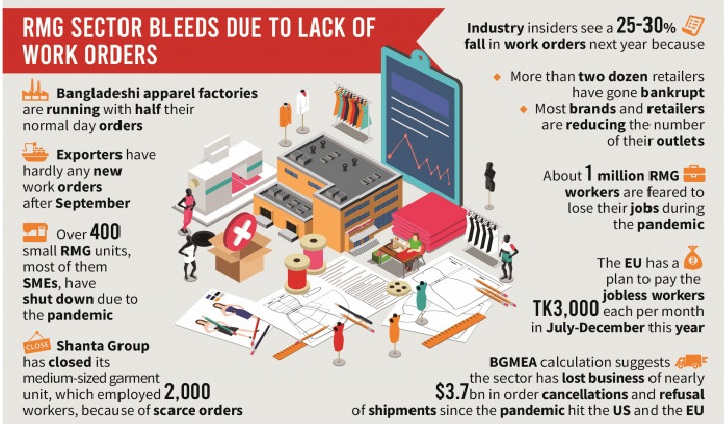Apparel store sales in the US almost tripled in May this year from what was in the previous month, showing signs of recovery from pandemic shocks, yet Bangladeshi apparel factories are trying to stay afloat with half their normal day orders.
This unheard-of 188 percent growth in May US sales from that of April seems to be a blip on the screen as even after this, retailers in the single largest market for Bangladeshi readymade garments saw over 60 percent decline in sales when compared to the same period of 2019.
Industry insiders see this as a swim or sink situation. "You can't keep your factory shuttered because that would as well wipe out the future when the pandemic would subside and the wheels of the economy would restart to turn at full steam," they explained.
But the fight is to keep the head above water in the meantime.
Apparel factory owners now report they have hardly any new work orders from September onwards, which they fear could lead to factory closures, especially for the smaller ones. August and September are lean periods for orders during regular times.
The first impact will be on employment as many workers will lose their jobs.
Even a leading knitwear exporter like Fazlul Hoque who owns Narayanganj-based Plummy Fashions says factories are running with 50 percent orders although the situation is improving as economies in the West have begun to reopen after Covid-19 lockdowns.
"That retail shops in Europe and America are reopening after shutdowns amid the pandemic is a positive sign for the industry. Hopefully, things will get back to normal within the next few months given that the pandemic could be brought under control."
Fazlul Hoque feels it is very important for small and medium factories to keep operations up and running or else buyers will not place orders once the economy stabilises.
However, Kutubuddin Ahmed, another stalwart in garments who owns Envoy Textile -- the greenest denim textile factory in the world, sees a damp squib.
"We've missed a season. Whether apparel makers will be able to cash in on the next season depends on the pandemic situation. However, things will not return to a pre-pandemic situation. Nobody knows when Europeans and Americans will start buying clothes again," he said.
Even more gloomy pictures emerge from some industry managers. Seeking anonymity, a director (marketing) of knit composite said the industry will face some challenges in the future, which include price-cutting due to overcapacity. This might force small factories to close down, he warned.
According to industry insiders, over 400 small RMG units, most of them SMEs, have already shut down due to the coronavirus outbreak.
Recently, a big conglomerate – Shanta Group has also closed its medium-sized garment unit, which employed 2,000 workers, because of orders drying up.
The marketing director expressed his fear that the industry may get 25-30 percent less work orders next year as more than two dozen retailers have already become bankrupt and most brands and retailers are reducing the number of their outlets.
He also said that the dwindling order situation will negatively impact workers' jobs.
"We are currently running our units at half the normal work orders. So, we haven't asked the workers staying at their village homes to join the factory," the garment high official said.
With the work orders that the group currently has, it can run its apparel units till September but they have no idea how they will run the factories thereafter, he maintained.
Entrepreneurs have to be prepared for that hard time and keep their businesses afloat, RMG exporters said, adding that adverse situations are nothing new to Bangladeshi entrepreneurs.
"I believe if we can survive the next six months, our future will be bright. Many opportunities will also come to us. Now is the time to make sacrifices and wait for good times to come," said Kutubuddin Ahmed.
Many big retailers are asking for discounts during the pandemic, while some others are behaving responsibly with their suppliers, in terms of sourcing without any penalty, on-time payment, and placing new orders, said MA Quader Anu, deputy managing director and CEO of DBL Group.
Mentioning that many retailers are doing everything right with some of its suppliers while cancelling orders with some others and are asking for discounts and deferred payments, Anu said it all depends on the buyers' relationship with their suppliers.
Meanwhile, labour leaders said last week they sat with the owners of around two dozen factories which have been closed permanently.
"We have negotiated with factory owners for about 50,000 workers' payments and other benefits," said Jolly Talukder, general secretary of Garments Workers' Trade Union Centre.
Narayanganj-based Anowara Group has terminated about 20,000 workers as they have plans to shift their units to the Rupganj area, she added.
According to an estimate, about one million RMG workers will l














